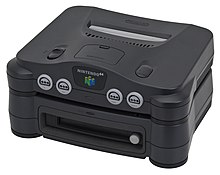Our website is made possible by displaying online advertisements to our visitors.
Please consider supporting us by disabling your ad blocker.
64DD
 | |
 A Nintendo 64 with the 64DD installed | |
| Developer | Nintendo, RandnetDD, Alps Electric |
|---|---|
| Manufacturer | Alps Electric |
| Type | Video game console peripheral |
| Generation | Fifth |
| Release date |
|
| Lifespan | December 11, 1999 – February 28, 2001 |
| Discontinued |
|
| Units sold | 15,000+[1] |
| Media | Magnetic disk (64 MB) |
| Storage | 36 megabit ROM (audio/font)[2] |
| Connectivity | 22.8 kbps dial-up modem[2] |
| Online services | Randnet[3] randnetdd.co.jp |
| Predecessor | Satellaview |
| Website | nintendo.com/n64/64dd.html at the Wayback Machine (archived 1998-02-05). Additional archives: 2000. |
The 64DD[a] is a magnetic floppy disk drive peripheral for the Nintendo 64 game console developed by Nintendo. It was announced in 1995, prior to the Nintendo 64's 1996 launch, and after numerous delays was released in Japan on December 11, 1999. The "64" references both the Nintendo 64 console and the 64 MB storage capacity of the disks,[4] and "DD" is short for "disk drive" or "dynamic drive".[2]
Plugging into the extension port on the underside of the console, the 64DD allows the Nintendo 64 to use proprietary 64 MB magnetic disks for expanded and rewritable data storage, a real-time clock for persistent game world design, and a standard font and audio library for further storage efficiency. Its games and hardware accessories let the user create movies, characters, and animations to use within various other games and shared online. The system could connect to the Internet through a dedicated online service, Randnet, for e-commerce,[5] online gaming, and media sharing.[6] Describing it as "the first writable bulk data storage device for a modern video game console",[7] Nintendo designed the 64DD as an enabling technology platform for the development of new genres of games and applications,[8] several of which were in development for several years.
Only ten disks had been released and Randnet had 15,000 subscribers when the 64DD was discontinued in February 2001. It was a commercial failure,[9] with at least 15,000 total units sold,[1] and was never released outside Japan. Most games once planned for 64DD were released as standard Nintendo 64 games, ported to other consoles such as the GameCube, or canceled.
IGN lamented the "broken promises" and "vaporware", summarizing the 64DD as "an appealing creativity package"[6] for "a certain type of user"[2] that "delivered a well-designed user-driven experience"—and as a "limited online experiment at the same time", which partially fulfilled Nintendo president Hiroshi Yamauchi's "longtime dream of a network that connects Nintendo consoles all across the nation".[2]
- ^ a b "The 64 Dream". The 64 Dream. February 2001.
- ^ a b c d e Schneider, Peer (February 9, 2001). "Everything About the 64DD". IGN. Archived from the original on August 8, 2019. Retrieved June 12, 2014.
- ^ Cite error: The named reference
Randnet announcement by Recruitwas invoked but never defined (see the help page). - ^ "Ultra 64 Tech Specs". Next Generation. No. 14. Imagine Media. February 1996. p. 40.
- ^ Cite error: The named reference
64DD at NOM 3was invoked but never defined (see the help page). - ^ a b "64DD: Broken Promises". IGN. Ziff Davis. February 23, 2001. Archived from the original on January 11, 2015. Retrieved January 11, 2015.
- ^ "Nintendo Reveals New Details on 64DD at N64 Developer's Conference". Nintendo of America. 1997. Archived from the original on June 6, 1997. Retrieved January 11, 2015.
- ^ Cite error: The named reference
The 64Dream Dec 1997was invoked but never defined (see the help page). - ^ "Super Nintendo Entertainment System Unrivaled Champion of the Fourth Generation". GameConsoles.co.uk. 2007. Archived from the original on June 27, 2008. Retrieved February 28, 2014.
Cite error: There are <ref group=lower-alpha> tags or {{efn}} templates on this page, but the references will not show without a {{reflist|group=lower-alpha}} template or {{notelist}} template (see the help page).
Previous Page Next Page


